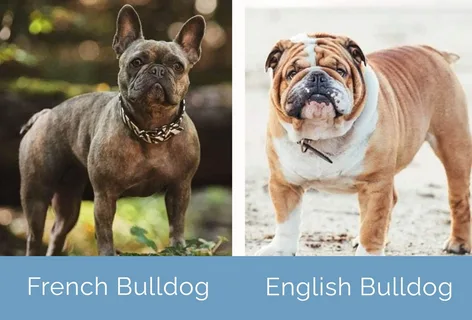When it comes to choosing between English Bulldogs and French Bulldogs, understanding the key differences and similarities is essential. Both breeds are lovable, unique, and have distinct traits that make them perfect companions for different lifestyles. This guide delves deep into the world of English and French Bulldogs, comparing their appearance, temperament, care needs, and more. By the end, you’ll be well-equipped to decide which breed suits your life best.
Introduction
Bulldogs are among the most popular dog breeds in the world, prized for their loyalty, charm, and unique looks. However, potential dog owners often face a dilemma: English or French? Each breed has its strengths and quirks, and choosing the right one means understanding their differences. This comprehensive guide will help you explore every aspect of these breeds, ensuring you make an informed and confident choice.
Physical Differences
1. Size and Build
- English Bulldog:
- Larger and stockier.
- Weight: 40–50 pounds.
- Height: Around 14–15 inches at the shoulder.
- French Bulldog:
- Smaller and more compact.
- Weight: 16–28 pounds.
- Height: 11–12 inches at the shoulder.
2. Facial Features
- Both breeds have the iconic flat face, but:
- English Bulldogs: Have a broader head and more pronounced wrinkles.
- French Bulldogs: Feature a more streamlined face with distinctive “bat ears.”
3. Tail
- English Bulldog: Typically has a short, straight, or screw-shaped tail.
- French Bulldog: Often has a naturally short and straight tail.
4. Coat and Colors
- Both breeds have short, smooth coats, but their color variations differ:
- English Bulldogs: Brindle, white, fawn, piebald, and red are common.
- French Bulldogs: Brindle, cream, fawn, pied, and unique variations like blue and lilac.
Temperament and Personality
1. English Bulldogs
- Laid-back and Gentle: Known for their calm demeanor.
- Affectionate: They love being around family and are great with kids.
- Stubborn: Training requires patience and consistency.
2. French Bulldogs
- Playful and Energetic: Often more spirited than their English counterparts.
- Attention Seekers: Thrive on human interaction and don’t like being left alone.
- Adaptable: Fit well in apartments due to their smaller size and moderate exercise needs.
Health Considerations
1. English Bulldogs
- Common Issues:
- Hip dysplasia, skin infections, and respiratory problems.
- Lifespan: 8–10 years.
2. French Bulldogs
- Common Issues:
- Brachycephalic airway syndrome, spinal problems, and allergies.
- Lifespan: 10–12 years.
Shared Concerns
Both breeds are brachycephalic, meaning their flat faces can lead to breathing difficulties. Owners should avoid excessive heat or strenuous exercise.
Exercise and Activity Levels
1. English Bulldogs
- Low Energy: Short walks and playtime suffice.
- Exercise Tips: Avoid overexertion, especially in hot weather.
2. French Bulldogs
- Moderate Energy: Enjoy short walks and interactive play.
- Exercise Tips: While they’re more active than English Bulldogs, they’re still prone to overheating.
Training and Intelligence
1. English Bulldogs
- Training Style: Gentle but firm.
- Challenges: Their stubborn nature requires patience.
2. French Bulldogs
- Training Style: Positive reinforcement works best.
- Advantages: They’re eager to please, making training slightly easier.
Living Environment
1. English Bulldogs
- Best for homes with space due to their size and tendency to lounge around.
- Prefer calm environments with minimal stairs.
2. French Bulldogs
- Perfect for apartments due to their smaller size and adaptability.
- Thrive in environments with consistent human interaction.
Cost of Ownership
1. English Bulldogs
- Initial Cost: $1,500–$4,000.
- Ongoing Expenses: Vet bills can be higher due to health issues.
2. French Bulldogs
- Initial Cost: $2,000–$8,000 (rare colors like blue can be pricier).
- Ongoing Expenses: Similar to English Bulldogs, but their smaller size may reduce food costs.
Which Breed is Right for You?
Choose an English Bulldog if:
- You want a calm, low-energy companion.
- You have space and time for a dog that enjoys lounging.
- You’re prepared for their health needs and grooming requirements.
Choose a French Bulldog if:
- You live in an apartment or have limited space.
- You prefer a playful and engaging dog.
- You can dedicate time to their social needs.
Frequently Asked Questions
1. Which breed is better with kids?
Both breeds are excellent with children, but English Bulldogs’ calmer demeanor may be better for younger kids.
2. Do they both snore?
Yes, due to their flat faces, both breeds are prone to snoring.
3. Are English or French Bulldogs easier to groom?
Both are low-maintenance, requiring regular brushing and cleaning of their facial folds.
4. Can they live together?
Yes, with proper socialization, English and French Bulldogs can live harmoniously.
5. Which breed lives longer?
French Bulldogs typically have a slightly longer lifespan (10–12 years) compared to English Bulldogs (8–10 years).
Final Thoughts
Both English and French Bulldogs are exceptional breeds, each offering unique traits that can complement different lifestyles. Whether you’re drawn to the robust charm of the English Bulldog or the playful adaptability of the French Bulldog, this guide ensures you have all the knowledge to make the best choice.

